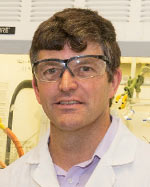Cancer Chemical Biology Faculty
 Jennifer Binning, PhD
Jennifer Binning, PhD
The Binning lab uses biochemistry and structural biology to study how oncoviruses such as Human Papillomavirus (HPV) hijack host ubiquitin machinery to support viral replication and drive tumorigenesis. By exploring the link between human disease states and dysregulation of ubiquitin pathways, we aim to identify new pathogenic mechanisms that will guide the development of diagnostics and therapeutics.

Derek Duckett, PhD
Research in the Duckett lab is focused on identifying novel anti-cancer targets , developing small molecule probes against these targets and interrogating how their altered signaling drives tumor progression, metastasis and therapy resistance.
 Haitao (Mark) Ji, PhD - Major Director
Haitao (Mark) Ji, PhD - Major Director
The Ji lab research focuses on the design and synthesis of small molecules that can modulate cancer-related cellular signaling pathways with an emphasis on protein-protein interactions and target specificity.
Aleksandra Karolak, PhD 
We use various computational approaches led by machine learning to enhance our understanding of cancer development, phenotypic progression, and variability in the response to treatment. Particularly, we are interested in how epigenetics, DNA structure, mutagenesis, protein modifications and interactomes can inform and support diagnosis, clinical decisions, as well as drug discovery and treatment optimization.
 John M. Koomen, PhD
John M. Koomen, PhD
The Koomen Lab uses mass spectrometry-based techniques to better understand cancer biology, evaluate hypotheses derived from basic science experiments in human tumors, and contribute to the development of novel strategies for patient assessment and treatment.
 Nicholas James Lawrence, PhD
Nicholas James Lawrence, PhD
Dr. Lawrence's group efforts are focused on the synthesis of new anticancer agents. The goal of the laboratory is to design and develop synthetic methodology to provide small organic molecules to act as selective anticancer agents against a range of molecular targets.
 Justin M. Lopchuk, PhD
Justin M. Lopchuk, PhD
Our research program is grounded in synthetic organic chemistry with a specific focus on the development of new reactions, the design of new reagents, and the total synthesis of natural products with anti-cancer activity.
 Vince C. Luca, PhD
Vince C. Luca, PhD
The Luca Lab studies how immune receptors can be reprogrammed to enhance antitumor responses. Tumors evade the immune system by hijacking inhibitory “off-switch” receptors in immune cells. To counteract this process, the Luca Lab is engineering synthetic ligands that can reinvigorate T cell function. These customizable signaling proteins currently being used to increase proliferation, guide differentiation, or promote tumor-killing function in various cancer models.
 Andrii Monastyrskyi, PhD
Andrii Monastyrskyi, PhD
The Monastyrskyi laboratory uses the tools of synthetic organic chemistry, medicinal chemistry, and chemical biology to develop small molecules for studying and modulating therapeutically relevant cancer targets.
 Uwe Rix, PhD
Uwe Rix, PhD
I am interested in targeted drugs, drug-protein interaction networks and drug synergy, particularly in the context of lung cancer, melanoma and their microenvironments. I am pursuing a multi-layered chemical biology/systems pharmacology strategy by screening for unexpected drug activity and identifying the molecular mechanisms of action through e.g. combining chemical proteomics and phosphoproteomics.
 Ernst Schonbrunn, PhD
Ernst Schonbrunn, PhD
Research from the Schönbrunn laboratory focuses on the elucidation of the structure-activity relationship of medicinally important proteins. We use protein crystallography combined with methods in biochemistry, molecular biology and medicinal chemistry to explore proteins at the atomic level. Our aim is to identify "weak sites" in those proteins that can be targeted by new inhibitors with potential as future drugs.
Cancer Chemical Biology PhD
